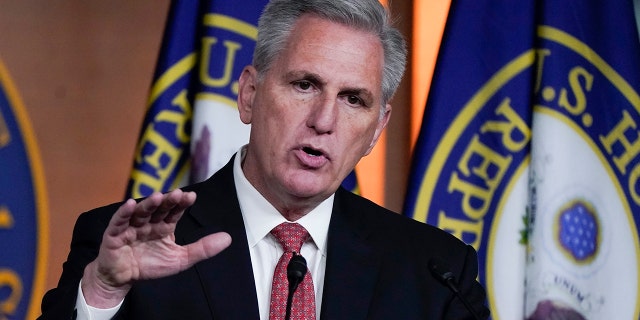2022 Midterms: Will a red wave overcome a blue wall?

Fox News Flash top headlines for January 1
Fox News Flash top headlines are here. Check out what’s clicking on Foxnews.com.
The chairs of the two GOP congressional reelection committees sound very confident that Republicans will win back majorities in the House of Representatives and Senate in the 2022 midterms.
“We’re going to take back the Senate, absolutely,” Sen. Rick Scott of Florida, the chair of the National Republican Senatorial Committee, vowed in an interview with Fox News two months ago.
And National Republican Congressional Committee chair Rep. Tom Emmer of Minnesota told Fox News a couple months ago, “Mark my words: Republicans will enter the 118th Congress with a majority and a record-breaking class of diverse members.”
Democrats are hoping to defend their razor-thin majorities in both chambers in this year’s midterm elections, but they’re facing historical headwinds and are dealing with an unfavorable political environment accentuated by President Biden’s flagging poll numbers.
President Biden at the White House on Dec. 20, 2021.
(Drew Angerer/Getty Images)
Let’s start with the House, where Republicans greatly exceeded expectations in 2020 and took a big bite out of the Democrats’ majority. While the GOP lost control of the White House and the Senate, Republicans flipped a dozen House seats and need a net gain of just five in the 435-member chamber in November to win back a majority they held for eight years before losing it amid a blue wave in the 2018 midterms.
Republicans have history on their side. On average, the party that wins the White House in a presidential election loses more than 25 House seats in the ensuing midterm election. And the once-in-a-decade congressional redistricting process may favor the GOP, as Republicans control more state legislatures and governors’ offices than the Democrats.
House retirements are often seen as an early barometer of things to come in the midterms. And last year 23 House Democrats announced that they’d retire after the current term or seek another office in the 2022 elections, compared to only 13 House Republicans.
House GOP leader Rep. Kevin McCarthy pointed to Democratic Rep. Ron Kind of Wisconsin’s August retirement announcement as a pivotal moment.
“When you sit back and you look and you want to pinpoint when was the bellwether, when was the moment in time that you truly felt that you knew that the majority was in play and you had the capability of winning – when Ron Kind said that he was retiring,” McCarthy told Fox News in an interview a couple of months ago.
Pointing to history and redistricting, the House GOP leader emphasized that “this cycle is like the 100-year storm.”
House Minority Leader Kevin McCarthy, R-Calif., takes questions from reporters at the Capitol in Washington, Friday, Dec. 3, 2021.
(AP Photo/J. Scott Applewhite)
And looking at the current climate, the longtime congressman from California argued that “you look at the issue set of where the public is at – crime, inflation, wokeism, the border – all of those the Democrats have to play defense. Republicans don’t have to play defense at all.”
While playing plenty of defense, the Democratic Congressional Campaign Committee (DCCC) emphasized to Fox News that “House Democrats are heading into the midterms with record-breaking fundraising numbers, earlier than ever investments in organizing, and an agenda that’s wildly popular among battleground voters.”
And DCCC spokesperson Chris Taylor argued that because “voters see Democratic members and candidates focused on rebooting the economy and getting folks back on the job,” the DCCC’s believes that “incumbent or not, we’re confident in our ability to win the House yet again.”
Republicans controlled the Senate for six years, but lost the majority a year ago, as they were narrowly swept in Georgia’s twin Senate runoffs on Jan. 5, 2021.
The Senate’s currently split 50-50 between the two major parties, but the Democrats have the majority thanks to the tie-breaking vote of Vice President Kamala Harris through her constitutional role as president of the Senate.
That means the Republicans need a net gain of just one seat in November to recapture the Senate majority.
The GOP’s defending 20 of the 34 seats up for grabs in 2022. That includes five open seats, including Republican retirements in the key battlegrounds of Pennsylvania and North Carolina and the competitive state of Ohio, as well as in Missouri, and Alabama.
But Republicans see strong opportunities to flip blue seats to red in Arizona, Georgia, Nevada and, potentially, New Hampshire, where first term Democratic senators are running for reelection in swing states.
Scott predicted that the GOP’s “going to do unbelievably in 2022 because we have the right message.”
GOP Sen. Rick Scott of Florida speaks with Fox News while attending the Republican Jewish Coalition’s annual conference in Las Vegas, Nevada, on Nov. 5, 2021
(Fox News )
Fighting back, the Democratic Senatorial Campaign Committee (DSCC) in September announced Defend the Majority, a $30 million program in nine Senate battleground states to beef up the party’s organizing infrastructure.
“Senate Democrats are delivering for the American people — now the DSCC is making early and historic investments in order to defend and expand Democrats’ majority in 2022,” DSCC chair Sen. Gary Peters said at the time.
While the battles for control of Congress will grab plenty of attention, 36 states are also holding contests for governor.
Republicans see pickup opportunities in eight states: Kansas, Maine, Michigan, Minnesota, Nevada, New Mexico, Pennsylvania and Wisconsin. Biden carried all those states — other than Kansas — in 2020. Democratic incumbent governors are running for reelection in all of those states, other than the key battleground of Pennsylvania, where the party seems to be coalescing around state Attorney General Josh Shapiro in the race to succeed term-limited Gov. Tom Wolf.
Republicans will be playing plenty of defense in Arizona and the blue states of Maryland and Massachusetts, where Govs. Doug Ducey and Larry Hogan are term-limited incumbents, and Gov Charlie Baker decided against running for a third term.
In the key battleground of Georgia, Republican Gov. Brian Kemp is hoping to survive to face a rematch with Democrat Stacey Abrams in 2022. But first things first. Kemp will have to fend off a GOP challenge from former Sen. David Perdue, who was encouraged to run by former President Donald Trump.
The former president is aiming to defeat Kemp as payback for the governor’s refusal to help Trump overturn his narrow 2020 election loss in Georgia to Biden.
Source: Read Full Article




